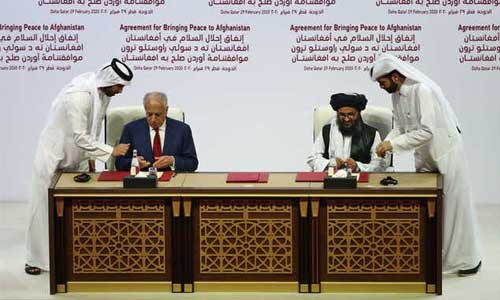The president of the United States, Donald Trump, in his usual surprising manner, announced on Wednesday night that ‘the remaining US troops in Afghanistan should be home by Christmas’ this year. The message clearly shows that President Trump wants the US troops back from Afghanistan as he had promised in his election campaign last time. More importantly, he has the coming US presidential election in mind and wants to give the impression that he can conclude the war in Afghanistan. However, his choice of time is tricky, as he has chosen Christmas as the return day for all the troops. This can help in gaining the sympathies of the military families who want their beloved members back with themselves. Nevertheless, it has never appeared that Trump is interested to see the situation in Afghanistan through the Afghan lens.
For Afghan people, in particular, the situation in Afghanistan has not reached to its conclusion. Two decades of war against terrorism has brought them nowhere. Though there have been some achievements as far as the constitution of the country and the human rights, in particular, women rights are concerned, the peace, better government structure and stable political system remain far-fetched. There is no surety about the future course of action, neither of the political system that may guarantee stability. State-building efforts in Afghanistan have faced failure, and the Afghan political system seems incapable of facing the serious challenges that are being raised by the circumstances. Meanwhile, the security situation is not satisfactory, and Afghan security forces face serious challenges to ensure their hold on more than half of the districts. Taliban, along with the talks in Qatar, have continued their fight against Afghan security forces. Above all, the much-awaited intra-Afghan peace talks that have started in Qatar faces a stalemate that seems difficult to solve at the moment.
The stalemate in intra-Afghan talks in Qatar is said to be on the basic framework of the talks. As expected Taliban have continued insisting on their version of Shariah as the starting point. They have even gone to the extent of excluding the Shia version altogether, neglecting the religious and the ethnic diversity that forms the fabric of Afghan society. Evidently, they have faced opposition, and they might change their strict stance in this regard; however, such controversial issues will remain the part and parcel of the whole process and will test nerves and temperaments.
Following the stalemate, there have been efforts to kick-start the talks; particularly, from the US side. Zalamay Khalilzad, the US Special Envoy for Reconciliation in Afghanistan, is on the forefront of such efforts. Definitely, he is the one who has to make some achievement for Trump administration before the US election; and an announcement of a ceasefire between Taliban and Afghan security forces will serve his purpose. Unfortunately, the achievement of such a ceasefire is being seen by the Trump administration as a mean to achieve something tangible before election, not as a mean to move towards lasting peace in the country and a better political system.
In the light of the short-term US approach, it is difficult to see how the process will achieve peace in the region. Trump’s Afghanistan policy can be deemed to be based on the urgency for a withdrawal that can prove that he is fulfilling his commitment to the people. Though it is ultimately important both for the US and the region that the US forces must withdraw from Afghanistan, the guarantees that such a withdrawal will result in a lasting peace in the country cannot be ascertained. US’s withdrawal from Iraq resulted in a sectarian war in the country that influenced the overall Middle East. While, the withdrawal of the Soviet Union from Afghanistan a few decades earlier also resulted in a civil war. Therefore, there are possibilities that Afghanistan may be pushed to another civil war if, based on urgency, the situation in Afghanistan is left vulnerable.
Unfortunately, US does not see intra-Afghan peace process as a comprehensive, long-term and an all-inclusive peace process that should be able to make decisions based on the ground realities in Afghanistan and bring all the stakeholders on the negotiation table and determine a future that can at least save them from war and instability. Trump administration sees Afghanistan issue as a project for which they have appointed a Project Manager who has to conclude it within a strict time-frame (before election). Such an approach will definitely bring only a temporary solution to a complex situation in Afghanistan, but will not pave the way for lasting peace in the country and region. In fact, the situation in Afghanistan can stabilize only through state-building measures that can ensure stability, inclusiveness, good governance and harmony.
Afghanistan’s neighboring countries also see the US policy with doubts. Pakistan, Iran, Russia, and China all have their reservations on the US’s Afghan policy. They may also concur with the US for the time being for a speedy withdrawal of the US forces from their immediate neighborhood, but for longer influence, they will have their own proxies within the Afghan society that is multi-ethnic in nature and has various warlords who can have influence over the power dynamics within the country.
Thus, what appears evident at present scenario is a temporary taming of a complex situation in Afghanistan. Though it can provide opportunities for betterment, it can never guarantee that such opportunities will be availed by all the stakeholders in the country and in the region that seem to have contradicting and, sometimes, conflicting interests.
Home » Opinion » The Flawed Approach to Peace in Afghanistan
The Flawed Approach to Peace in Afghanistan
| Sajjad Aasim

